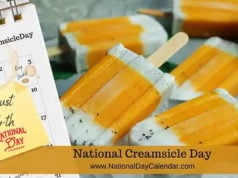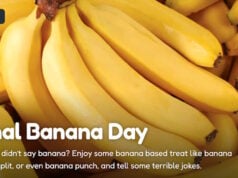
Whether getting one to go or lingering over a second cup, on September 29th be sure to observe National Coffee Day!
- The earliest credible evidence of either coffee drinking or the knowledge of the coffee tree appears in the middle of the 15th century in the Sufi monasteries around Mokha in Yemen.
- Brazil produces more coffee in the world than any other country, Colombia closely follows.
- It wasn’t always called ‘coffee’. People surmise the word “coffee” entered the English language sometime in the 16th century. Apparently, it was borrowed from the Italian word “caffe,” which comes from the Dutch word “koffie,” taken from the Ottoman Turkish “kahve,” which stemmed from Arabic “qahwah.”
- The drink dates back to 800 A.D. Legend has it that 9th-century goat herders noticed the effect caffeine had on their goats, who appeared to “dance” after eating the fruit of the Coffea plant. A local monk then made a drink with the product and found that it kept him awake at night, thus the original cup of coffee was born.
- In 1670, Baba Budan smuggled coffee seeds out of the Middle East by strapping seven seeds onto his chest. The first plants grown from these stowed away seeds were planted in Mysore. Coffee later spread to Italy and the rest of Europe, Indonesia, and the Americas.
- It’s the world’s 2nd largest traded commodity. Crude oil is first.
- In ancient Arab culture, a woman could only divorce her husband if he didn’t like her coffee.
- Coffee is a fruit. Coffee beans grow on a bush. They are actually the pit of a berry, which makes them a fruit.
- “Kopi Luwak” is the most expensive coffee in the world. It comes from Indonesia and is made from beans digested from the Asian Palm Civet. In other words, it comes from cat poop. It sells for €350 and up per kilo!
- Hawaii is the only American state that grows coffee
- Drinking coffee was once punishable by death ! During the 17th century Ottoman Empire, it was believed that coffee contained mind-altering effects. The ruler of this period believed it to be a type of narcotic and banned it from public consumption.
- An American spends on average $1,092 a year on coffee. That’s around $20 a week. That is also close to the price of the newest iPhone X.
- The “Big Four” coffee roasting companies – Kraft, P&G, Sara Lee and Nestle – buy about 50% of the coffee produced worldwide.
- The taste of coffee is different from its scent due to your saliva diluting the flavor.
- People from New York drink seven times more coffee than other cities in the United States.
- Starbucks first began by only selling roasted whole coffee beans.
- Starbucks’ Coffee contains more caffeine than energy drinks.
- The world consumes about 2.25 billion cups of coffee each day
- The first webcam was created to watch over a coffee pot to avoid unnecessary trips to an empty pot.
- An American inventor named George Washington invented instant coffee in 1910.
- Yelling for exactly 8 years, 7 months, and 6 days will allow you to generate enough heat to make one cup of coffee.
- Coffee consumed between the hours of 9:30 to 11:30 am is believed to be the most effective
- More than half of the population in the United States drinks coffee every single day.
- The Netherlands is the world’s largest per capita coffee consumer.
- Research links moderate consumption (about three to four cups per day) with a longer life span, plus a reduced risk of cardiovascular disease, type 2 diabetes and Parkinson’s, according to Harvard Health Publishing.
- Decaf does not mean caffeine-free. An eight-ounce brewed cup of decaf coffee actually contains two to 12 milligrams of caffeine, the Mayo Clinic states. In comparison, a regular cup of coffee supplies between 95 to 200 milligrams, while one can of cola has about 23 to 35 milligrams of caffeine.
- Teddy Roosevelt reportedly coined Maxwell House’s slogan. On a 1907 visit to Andrew Jackson’s former estate, the commander in chief supposedly dubbed a cup of Maxwell House joe “good to the last drop,” a catchphrase still used today.
- You can order coffee 25,000 different ways at Dunkin’. It sells 2 billion cups globally per year, enough for customers to pick each option 80,000 times.
- New York City has the most coffee shops in the U.S. per capita.
- Brazil couldn’t afford to send its athletes to Los Angeles for the 1932 Olympics, so the government loaded them in a ship full of coffee which was sold on the way to finance their trip.
- In 16th century Constantinople, not providing your wife with enough coffee was grounds for divorce.
- The word espresso comes from Italian and means “expressed” or “forced out”. Espresso is made by forcing very hot water under high pressure through finely ground, compacted coffee.
- According to International Coffee Association, Europe imports more coffee than the USA. Also, Brazil is the lead exporting country in coffee.
- Finland consumes the most coffee in the world.
- Before coffee became popular in the United States, the breakfast drink of choice was cider or beer, even for children.
- Regularly drinking coffee may have health benefits such as reduced risk of illnesses like cancer, heart disease and Alzheimer’s.
Sources:












